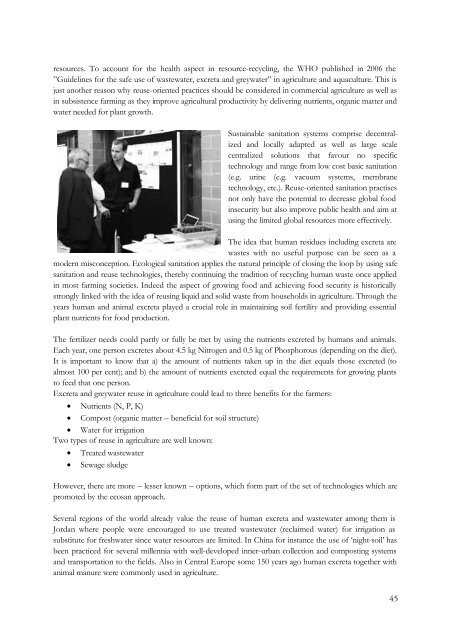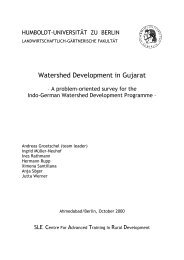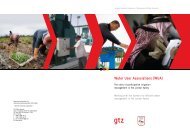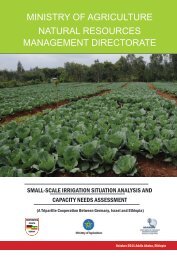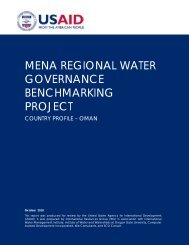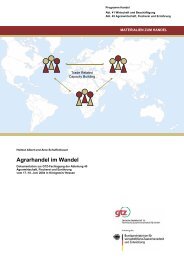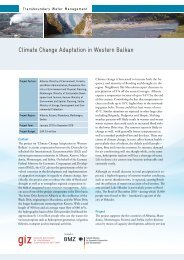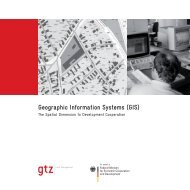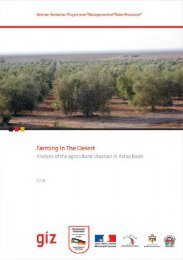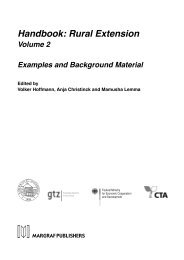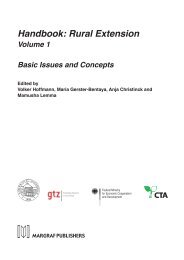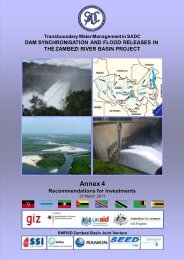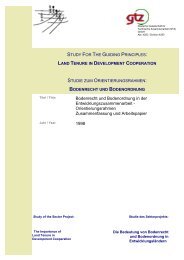Wasser in der Landwirtschaft - agriwaterpedia.info
Wasser in der Landwirtschaft - agriwaterpedia.info
Wasser in der Landwirtschaft - agriwaterpedia.info
Sie wollen auch ein ePaper? Erhöhen Sie die Reichweite Ihrer Titel.
YUMPU macht aus Druck-PDFs automatisch weboptimierte ePaper, die Google liebt.
esources. To account for the health aspect <strong>in</strong> resource-recycl<strong>in</strong>g, the WHO published <strong>in</strong> 2006 the<br />
”Guidel<strong>in</strong>es for the safe use of wastewater, excreta and greywater” <strong>in</strong> agriculture and aquaculture. This is<br />
just another reason why reuse-oriented practices should be consi<strong>der</strong>ed <strong>in</strong> commercial agriculture as well as<br />
<strong>in</strong> subsistence farm<strong>in</strong>g as they improve agricultural productivity by deliver<strong>in</strong>g nutrients, organic matter and<br />
water needed for plant growth.<br />
Susta<strong>in</strong>able sanitation systems comprise decentralized<br />
and locally adapted as well as large scale<br />
centralized solutions that favour no specific<br />
technology and range from low cost basic sanitation<br />
(e.g. ur<strong>in</strong>e (e.g. vacuum systems, membrane<br />
technology, etc.). Reuse-oriented sanitation practises<br />
not only have the potential to decrease global food<br />
<strong>in</strong>security but also improve public health and aim at<br />
us<strong>in</strong>g the limited global resources more effectively.<br />
The idea that human residues <strong>in</strong>clud<strong>in</strong>g excreta are<br />
wastes with no useful purpose can be seen as a<br />
mo<strong>der</strong>n misconception. Ecological sanitation applies the natural pr<strong>in</strong>ciple of clos<strong>in</strong>g the loop by us<strong>in</strong>g safe<br />
sanitation and reuse technologies, thereby cont<strong>in</strong>u<strong>in</strong>g the tradition of recycl<strong>in</strong>g human waste once applied<br />
<strong>in</strong> most farm<strong>in</strong>g societies. Indeed the aspect of grow<strong>in</strong>g food and achiev<strong>in</strong>g food security is historically<br />
strongly l<strong>in</strong>ked with the idea of reus<strong>in</strong>g liquid and solid waste from households <strong>in</strong> agriculture. Through the<br />
years human and animal excreta played a crucial role <strong>in</strong> ma<strong>in</strong>ta<strong>in</strong><strong>in</strong>g soil fertility and provid<strong>in</strong>g essential<br />
plant nutrients for food production.<br />
The fertilizer needs could partly or fully be met by us<strong>in</strong>g the nutrients excreted by humans and animals.<br />
Each year, one person excretes about 4.5 kg Nitrogen and 0.5 kg of Phosphorous (depend<strong>in</strong>g on the diet).<br />
It is important to know that a) the amount of nutrients taken up <strong>in</strong> the diet equals those excreted (to<br />
almost 100 per cent); and b) the amount of nutrients excreted equal the requirements for grow<strong>in</strong>g plants<br />
to feed that one person.<br />
Excreta and greywater reuse <strong>in</strong> agriculture could lead to three benefits for the farmers:<br />
• Nutrients (N, P, K)<br />
• Compost (organic matter – beneficial for soil structure)<br />
• Water for irrigation<br />
Two types of reuse <strong>in</strong> agriculture are well known:<br />
• Treated wastewater<br />
• Sewage sludge<br />
However, there are more – lesser known – options, which form part of the set of technologies which are<br />
promoted by the ecosan approach.<br />
Several regions of the world already value the reuse of human excreta and wastewater among them is<br />
Jordan where people were encouraged to use treated wastewater (reclaimed water) for irrigation as<br />
substitute for freshwater s<strong>in</strong>ce water resources are limited. In Ch<strong>in</strong>a for <strong>in</strong>stance the use of ‘night-soil’ has<br />
been practiced for several millennia with well-developed <strong>in</strong>ner-urban collection and compost<strong>in</strong>g systems<br />
and transportation to the fields. Also <strong>in</strong> Central Europe some 150 years ago human excreta together with<br />
animal manure were commonly used <strong>in</strong> agriculture.<br />
45


